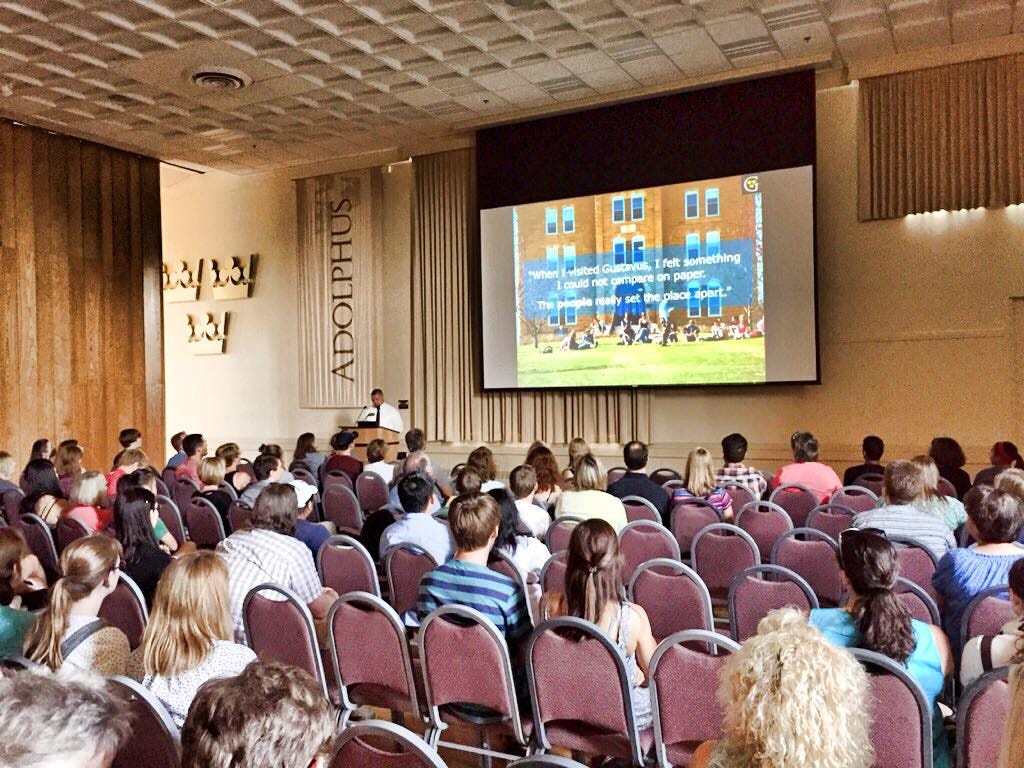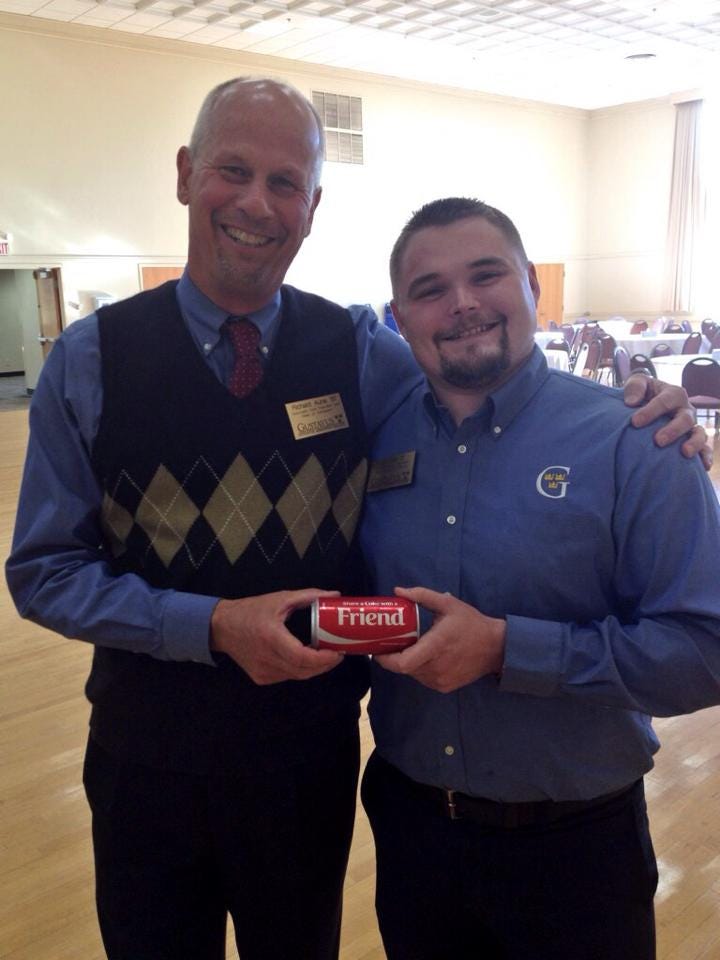Vistas on the Horizon
Looking back, looking ahead, looking out.
I was bouncing a knee in the lobby of the admission office shortly before 8 a.m. when Rich Aune walked in.
He sized me up.
“What are you doing here?” he asked.
It was January 3, 2012. It was my first day of work as an admission counselor—my first “real” job after graduating from college six months earlier.
I didn’t know Rich very well at the time. I’d worked in the same office for a year as a student-employee and we had a good relationship, but he was also adjusting to a new role after being promoted to serve as the Dean of Admission. And I was trying to establish myself as a professional.
“Just thought I might be able to help,” I said.
He looked me up and down again.
“Good,” he said. “I’ll show you your office.”
I’d applied for an admission counselor job the summer after graduation but was the second choice for the position. I was back in my hometown working in community education for the public school district, doing a mix of school-age daycare and youth sports. It was an okay job but it didn’t feel like something I wanted to do forever. I’d had a few conversations about an entry level marketing position at a big health insurance company and was waiting for the next interview when I got an unexpected phone call.
“One of the staff is leaving for a new position and we’d like you to join the admission team,” the enrollment vice president at the time told me. “You just interviewed and people liked you, so it’s yours if you want it.”
What can I say? He had a way with words.
I said yes on the spot, then said yes to almost everything else in the job for the next several years.
Now, you may think that every admission counselor is just a summer camp counselor or college orientation leader with a steady paycheck. Rah Rah! Whistles and jazz hands. Come to (INSERT COLLEGE/UNIVERSITY HERE) and you’ll have the best four years of your life!
And for many of them, that’s true.
But this is not my personality. To the contrary, I had to give myself pep talks before setting up my table at college fairs. You want to be good at your job, I remember thinking, and for the next two hours that means standing here and making small talk with teenagers. I much preferred meeting with students and families in the admission office on campus, where I could make personal connections and talk about their individual interests, goals, and how college might help achieve them.
My recruiting territory meant I usually took a weeklong road trip through northwest Minnesota in late September and spent a week or so in both Colorado and Nebraska in the fall and spring. I also had a few high schools in the Twin Cities suburbs that I’d visit a couple times a year.
When we were on campus, the entry-level admission counselors would work with students to complete their admission files, meet with them when they visited campus to answer their questions, then review their applications. The on-the-road work was a mix of college fairs, visits to high school guidance counselor offices, and individuals visits at coffee shops or people’s homes.
I loved it because of the variety of work it entailed, the energy of a college campus, and the opportunity to learn about so many different areas of how a college or university operates. As an admission counselor at a residential liberal arts college, you need to know at least a little bit about every academic program, athletic team, campus organization, fine arts activity, and administrative office on campus. Many of the lessons that I learned in those first few years are ones that I still use every day in my current position.

One of the highlights of my travels each fall was attending the Western Slope College Fair in Aspen, Colorado.
Now, before you make the snap judgement that you may have been conditioned to make—that a private liberal arts college recruiting students in Aspen is representative of an out-of-touch economic and academic class—some might use the term “elite”—let me quickly disabuse you of the notion.
First, the Western Slope College Fair in Aspen is the only major college fair each year that covers students from all of western Colorado, an area larger than the state of Pennsylvania. Over 200 colleges and universities attend. Despite being held in Aspen, the fair draws students from a range of communities, backgrounds, economic circumstances, and interests.
And Gustavus is expensive, yes, but it also provides significant merit- and need-based financial assistance for students in addition to individual support that they might not receive at bigger schools. According to the Minnesota Department of Education, the cumulative debt load for students who earn a bachelor’s degree at a private non-profit college in Minnesota is only ~$4-5,000 more more than those who attend an institution in the University of Minnesota or Minnesota State system.
Colleges and universities (including expensive private ones) unlock opportunities for economic advancement for students. As much as we like to think that each of us is special and can transcend the economic circumstances of our birth through hard work and #grind, the numbers don’t lie—a college degree is one of the single most important indicators of a person’s lifetime earnings. That being said, I want to be clear that I’m not saying it’s for everyone. We need skilled tradespeople, for example, and good ones can earn as much or more as many college graduates. But we’re talking about averages here, and on the balance college is good for people from an economic perspective.
I could go on about how colleges and universities are a public good for many other reasons, including that they serve as economic drivers within our communities, states, and the nation. And I’ve never seen political indoctrination take place in a college class despite spending half of my life on campus. I stopped watching the news awhile ago—most of what the red-faced anchors and pundits say doesn’t reflect what I see in my daily life on campus or more broadly. I don’t need a bunch of ginned-up anger and bad-faith arguments impacting my life, and neither do you.
Anyway, I rolled into Aspen on a Saturday in early October and checked into my hotel. My knowledge of the town was informed by a loose constellation of ideas—my brother’s service industry work and ski bumming in a different resort community, Hunter S. Thompson and Jimmy Buffett, rich people taking long weekends, and Dumb and Dumber. On my walk to dinner, I saw art galleries where my annual income wouldn’t make much of a dent. I joined a group of colleagues from other schools for dinner. I’m introverted and a little bit shy, so I never liked these small-talk networking events. When the group finished dinner and made plans to visit a nearby club, I excused myself and looked for a quieter bar to have a few drinks.
At the college fair the next day, I managed to make connections with a few students who eventually chose Gustavus, though I wouldn’t know it for several months (and in one case, a year and a half). Such is life in the college admission business. After packing up my brochures, I left town and drove alone in my rental car across Independence Pass the week before it closed for the winter. It was one of the most beautiful drives I’ve ever been on and only a little bit white knuckle. I stopped in Leadville to get gas. It’s the highest-elevation incorporated city in the United States—a sign outside of town says “We ♡ Leadville: Great Living @ 10,200’.”
My other travels took me to New Orleans (karaoke on Bourbon Street and jazz at Preservation Hall); Omaha and Lincoln, Nebraska; Hartford and New Haven, Connecticut; Detroit and San Antonio; and Washington D.C., among other places. Being an admission counselor is a great job for a person in their 20s.
As much as I liked to travel, I always preferred to be on campus. That’s where the magic happens: getting to talk everyday with smart people from all kinds of different backgrounds and disciplines, playing pick-up soccer on my lunch break, calling play-by-play for one of the best women’s hockey teams in NCAA Division III, eating in the cafeteria. Meeting Hayley.
Back in 2017, I bought my house in Saint Peter from the men’s tennis coach. I lived half a block from campus and right across the street from Rich, my first boss.
Rich graduated from Gustavus in 1981, 30 years before I walked across the commencement platform. Today, he’s one of my best friends and most trusted mentors.
He retired a couple years ago. He and his wife, Tami, (who also spent her whole career at Gustavus), spent this summer cleaning out their house and getting ready to move. They closed on the house and left town at the end of August. I miss talking to Rich on the street and having dinner in their screen porch, but I’m glad, I guess. The seasons are about to change. Summer to fall, Minnesota to Nova Scotia, seasons of life. Change is okay.
As I prepare to leave Gustavus and Saint Peter myself in a few short weeks, I’ve been thinking a lot about what it means to be part of a community. College campuses are special places, despite what the cynics say. I’m glad I’ve been a part of this one for so long. It’s easier to focus on all the things you didn’t get done, but I like to think I’ve made a difference.
I remember the first question that Rich ever asked me, back when I applied to be a student tour guide all those years ago.
“What do you do if you see an empty beer can or piece of litter on campus?”
“Pick it up,” I said.
“Great,” he said, reaching out to shake my hand. “I’ve never hired anyone who said anything else.
Taking care of this place is everyone’s responsibility.”






Well said, indeed!
Well said! I enjoyed working with you during these years, too. Gustavus was a place to learn and grow as a professional - as you well know. 😉
Enjoy these last days as they are very precious.